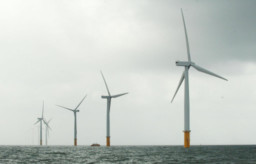A £2 billion windfarm development off the coast of Fife is teetering on a knife edge as a deadline to reach financial close looms.
Under the terms of its Contract for Difference agreement with the UK Government, Mainstream Renewable Power has until March 26 to sign off the 450MW Neart na Gaoithe (NNG) scheme.
However, that will not happen unless the courts dismiss bird protection charity RSPB Scotland’s ongoing judicial review into the Scottish Government’s decision to award consents to NNG and two other neighbouring schemes.
Mainstream chief operating officer Andy Kinsella said that, to date, the NNG project had taken 7 years and cost more than £50 million.
“At the time, 10 franchises were awarded,” Mr Kinsella said.
“Three have since got consent but only one, NNG, has got a CfD (Contract for Difference) that allows you to finance the project,
“As well as a CfD, you need a power purchase agreement and we have four separate offers for 100% of the output, which shows the strength of the project.
“We are 100% ready to go. We have been talking to the debt capital markets commercial banks for 18 months to two years and we have the £1.5bn of debt funding in place.
“We ran a process in the middle of last year to look for the equity for the project and we had 18 different parties approach us. Coming out of that , a consortium has formed to provide the other £500m.”
The consortium is led by US independent power producer Intergen a firm with its European headquarters in Edinburgh Siemens Bank, the Paris-based Marguerite Fund and InfraRed Capital Partners, based in London.
Mainstream currently owns the project outright but the Intergen consortium will become developer if financial close on the project can be achieved by March 26, the date mandated in the project CfD agreement.
The major spanner in the works is RSPB Scotland’s judicial review.
Mr Kinsella said: “The appeal is by the RSPB against Scottish Ministers so the Mainstream NNG, Seagreen and Inch Cape projects are not parties to this court case. We are all sitting on the sidelines waiting.”
Mr Kinsella said the March deadline was critical and it was possible the project could be scuppered if there was no resolution.
“We are ready to sign off on this £2bn sterling investment in electrical infrastructure in Scotland but, until we see the output of the judicial review, we can’t get to that financial close,” he said.
“Depending on the view they take, this project is at risk.”
Mainstream have completed an economic breakdown of the project and it estimates 500 jobs will be created in the three-year build phase, and at least £550m of the total project cost will be spent in the Scottish supply chain.
The company also anticipates that a further £1.8bn will be spent operating and maintaining (O&M) the array over its projected 25-year lifetime and around 100 roles will be created.
Local politicians are keen to see those jobs based in Dundee, but the city’s port is just one of several possible O&M bases, including Rosyth and Leith.
German industrial giant Siemens will provide cutting-edge 7MW turbines and its Manchester-based transmission and distribution arm will provide electrical expertise to connect the network.
Antwerp-based Deme GeoSea is in line to provide jackets, pile foundations and installation support to the project.
Mr Kinsella said NNG was an innovative project.
“We bid and we won the Contract for Difference at £114.38.
“Even though that is the lowest price ever for offshore wind in the UK, we have been able to put the finance for the project in place.
“It will bring all of this investment into Scotland and, on top of that, there will be the operational spend for the next 25 years.”
Mr Kinsella said the site could be producing power within three years if it could meet the CfD deadline.
“We could be up and running in 2019 if we can reach financial close on March 26,” he continued. “But that depends on the output of the judicial review.”
